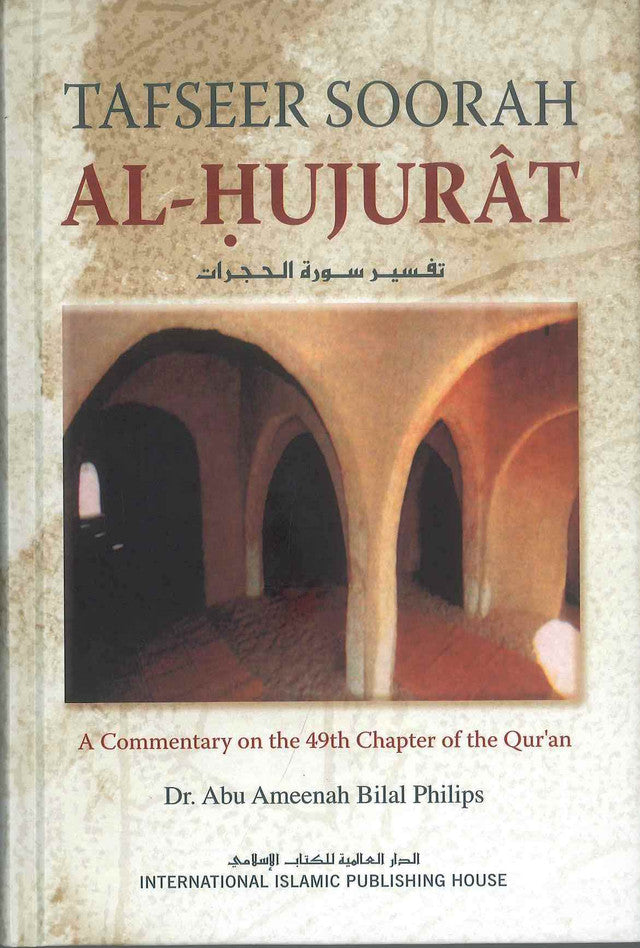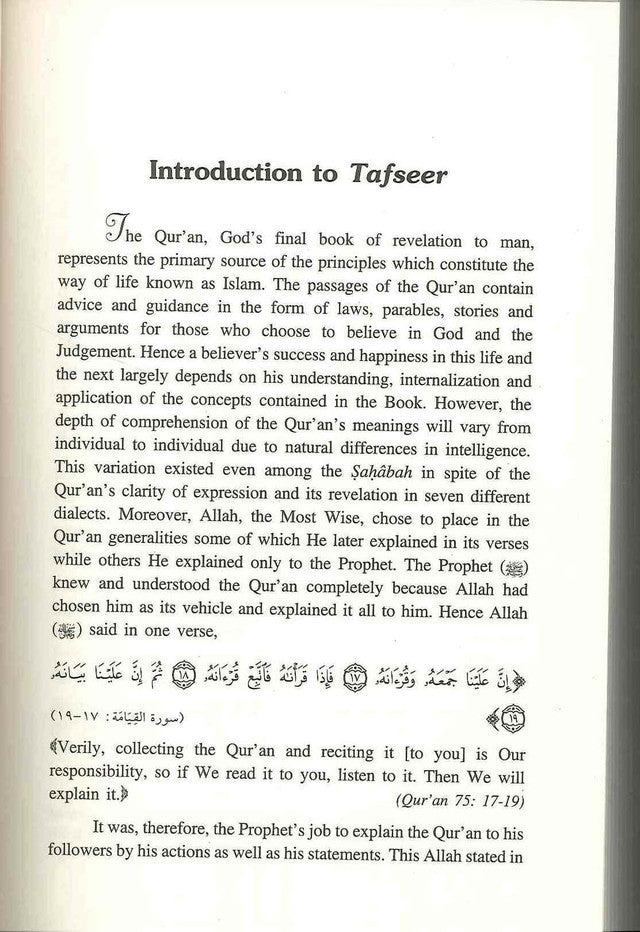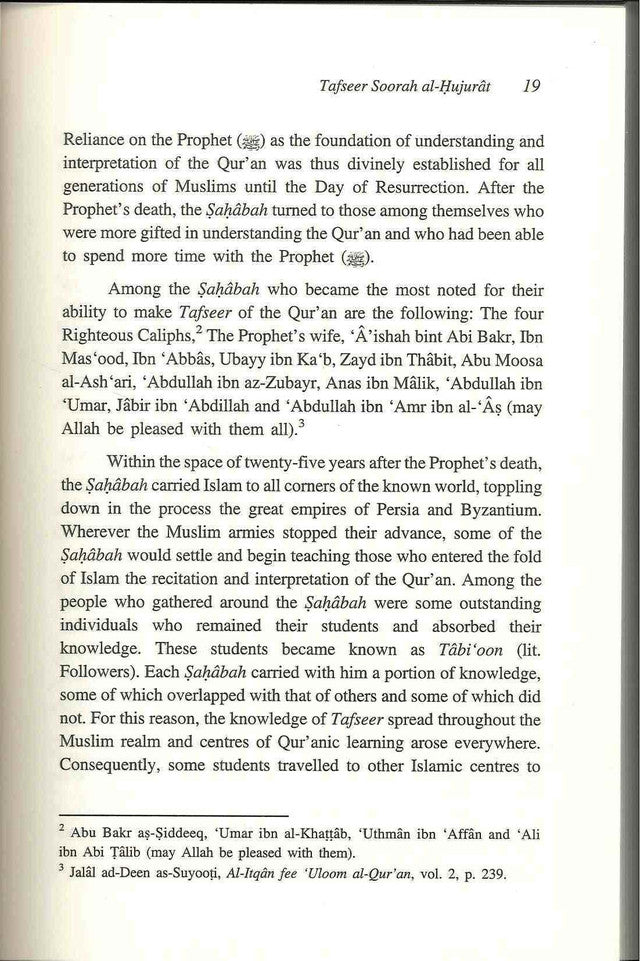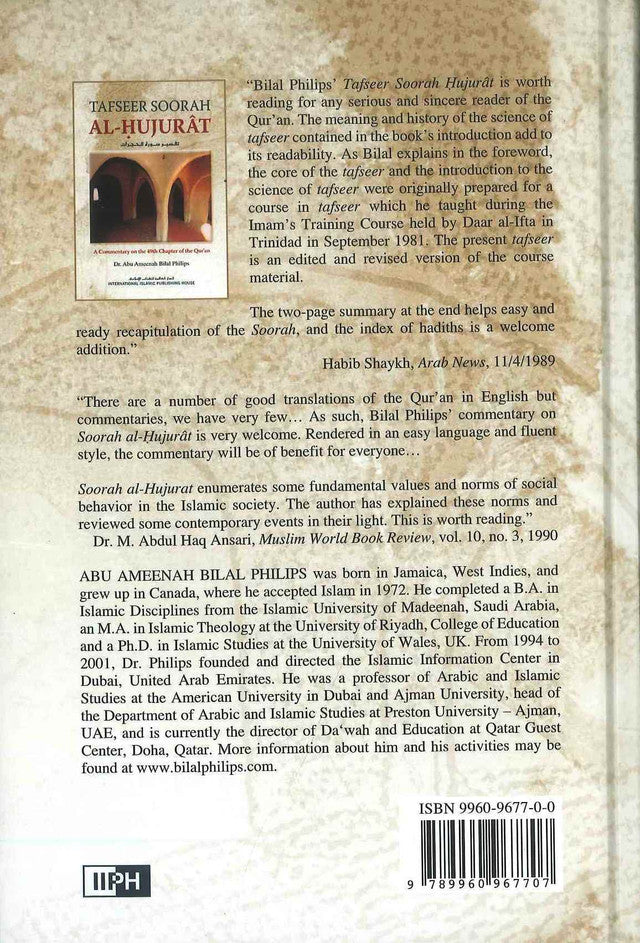Tafseer Soorah Al-Hujurat by Abu Ameena Bilal Philips
Tafseer Soorah Al-Hujurat by Abu Ameena Bilal Philips
Publisher:
IIPH (International Islamic Publishing House)
Language:
English
Binding:
Hard Cover
Pages: 304
Size: 17x22cm
Couldn't load pickup availability




Collapsible content
Description of Book
Tafseer Soorah Al-Hujurat by Abu Ameena Bilal Philips
“Tafseer Soorah Hujuraat: A Commentary on the 49th Chapter of the Qur’an” by Dr. Abu Ameenah Bilal Philips is a profound and enlightening exploration of one of the most socially relevant chapters in the Qur'an. Soorah Hujuraat, also known as "The Rooms" or "The Chambers," is rich in guidance on social conduct, interpersonal relationships, and the moral framework necessary for building a harmonious and God-conscious community. This commentary offers readers not only a detailed explanation of the verses but also a deeper appreciation for the timeless wisdom embedded in the Qur’anic message.
Dr. Bilal Philips—an internationally respected Islamic scholar and educator—begins the book with an insightful introduction to the science of tafseer (Qur’anic exegesis). This section is particularly valuable for readers who may be new to tafseer or who wish to understand its scholarly development and role in Islamic thought. It outlines how tafseer emerged as a discipline, its methodologies, and its critical importance in accurately interpreting the divine text. This background enriches the reader’s experience and deepens their understanding of the tafseer that follows.
Publisher
IIPH (International Islamic Publishing House)
Author
Sample Pages - Content
PAGE NO :1
TAFSEER SOORAH
AL-HUJURAT
تفسير سورة الحجرات
A Commentary on the 49th Chapter of the Qur'an
Dr. Abu Ameenah Bilal Philips
الدار العالمية للكتاب الإسلامي
INTERNATIONAL ISLAMIC PUBLISHING HOUSE
PAGE NO :2
The Introduction to Tafseer
Qur'an, God's final book of revelation to man, represents the primary source of the principles which constitute the way of life known as Islam. The passages of the Qur'an contain advice and guidance in the form of laws, parables, stories and arguments for those who choose to believe in God and the Judgement. Hence a believer's success and happiness in this life and the next largely depends on his understanding, internalization and application of the concepts contained in the Book. However, the depth of comprehension of the Qur'an's meanings will vary from individual to individual due to natural differences in intelligence. This variation existed even among the Şahâbah in spite of the Qur'an's clarity of expression and its revelation in seven different dialects. Moreover, Allah, the Most Wise, chose to place in the Qur'an generalities some of which He later explained in its verses while others He explained only to the Prophet. The Prophet () knew and understood the Qur'an completely because Allah had chosen him as its vehicle and explained it all to him. Hence Allah () said in one verse,
إنَّ عَلَيْنَا جَمعَهُ وَقُرْهَانَهُ فَإِذَا فَرَأَنَهُ فَاتَّبِعْ قُرْهَانَهُ ثُمَّ إِنَّ عَلَيْنَا بَيَانَهُ
(سورة القيامة : (۱۷-۱۹
Verily, collecting the Qur'an and reciting it [to you] is Our responsibility, so if We read it to you, listen to it. Then We will explain it.) (Qur'an 75: 17-19)
It was, therefore, the Prophet's job to explain the Qur'an to his followers by his actions as well as his statements. This Allah stated in
PAGE NO :3
Tafseer Soorah al-Hujurat 19
Reliance on the Prophet () as the foundation of understanding and interpretation of the Qur'an was thus divinely established for all generations of Muslims until the Day of Resurrection. After the Prophet's death, the Şahâbah turned to those among themselves who were more gifted in understanding the Qur'an and who had been able to spend more time with the Prophet ().
Among the Şahâbah who became the most noted for their ability to make Tafseer of the Qur'an are the following: The four Righteous Caliphs,2 The Prophet's wife, 'Â'ishah bint Abi Bakr, Ibn Mas 'ood, Ibn 'Abbâs, Ubayy ibn Ka'b, Zayd ibn Thâbit, Abu Moosa al-Ash'ari, 'Abdullah ibn az-Zubayr, Anas ibn Mâlik, 'Abdullah ibn
'Umar, Jâbir ibn 'Abdillah and 'Abdullah ibn 'Amr ibn al-'Âş (may Allah be pleased with them all).3
Within the space of twenty-five years after the Prophet's death, the Şahâbah carried Islam to all corners of the known world, toppling down in the process the great empires of Persia and Byzantium. Wherever the Muslim armies stopped their advance, some of the Şahâbah would settle and begin teaching those who entered the fold of Islam the recitation and interpretation of the Qur'an. Among the people who gathered around the Şahâbah were some outstanding individuals who remained their students and absorbed their knowledge. These students became known as Tabi'oon (lit. Followers). Each Şahâbah carried with him a portion of knowledge, some of which overlapped with that of others and some of which did not. For this reason, the knowledge of Tafseer spread throughout the Muslim realm and centres of Qur'anic learning arose everywhere. Consequently, some students travelled to other Islamic centres to
Abu Bakr aş-Şiddeeq, 'Umar ibn al-Khattab, 'Uthmân ibn 'Affan and 'Ali ibn Abi Talib (may Allah be pleased with them).
3 Jalâl ad-Deen as-Suyooți, Al-Itqân fee 'Uloom al-Qur'an, vol. 2, p. 239.
PAGE NO :4
TAFSEER SOORAH
AL-HUJURAT
تفسير سورة الحجرات
A Cry on the Chapter of the Qu Dr. Abu Arab Bilal Philips
"Bilal Philips' Tafseer Soorah Hujurât is worth reading for any serious and sincere reader of the Qur'an. The meaning and history of the science of tafseer contained in the book's introduction add to its readability. As Bilal explains in the foreword, the core of the tafseer and the introduction to the science of tafseer were originally prepared for a course in tafseer which he taught during the Imam's Training Course held by Daar al-Ifta in Trinidad in September 1981. The present tafseer is an edited and revised version of the course material.
The two-page summary at the end helps easy and ready recapitulation of the Soorah, and the index of hadiths is a welcome addition."
Habib Shaykh, Arab News, 11/4/1989
"There are a number of good translations of the Qur'an in English but commentaries, we have very few... As such, Bilal Philips' commentary on Soorah al-Hujurât is very welcome. Rendered in an easy language and fluent style, the commentary will be of benefit for everyone...
Soorah al-Hujurat enumerates some fundamental values and norms of social behavior in the Islamic society. The author has explained these norms and reviewed some contemporary events in their light. This is worth reading."
Dr. M. Abdul Haq Ansari, Muslim World Book Review, vol. 10, no. 3, 1990
ABU AMEENAH BILAL PHILIPS was born in Jamaica, West Indies, and grew up in Canada, where he accepted Islam in 1972. He completed a B.A. in Islamic Disciplines from the Islamic University of Madeenah, Saudi Arabia, an M.A. in Islamic Theology at the University of Riyadh, College of Education and a Ph.D. in Islamic Studies at the University of Wales, UK. From 1994 to 2001, Dr. Philips founded and directed the Islamic Information Center in Dubai, United Arab Emirates. He was a professor of Arabic and Islamic Studies at the American University in Dubai and Ajman University, head of the Department of Arabic and Islamic Studies at Preston University - Ajman, UAE, and is currently the director of Da'wah and Education at Qatar Guest Center, Doha, Qatar. More information about him and his activities may be found at www.bilalphilips.com.
IIPH
Who is Dr. Abu Ameenah Bilal Philips?
Dr. Abu Ameenah Bilal Philips is a renowned Islamic scholar, author, and educator known for his efforts to make Islamic knowledge accessible to a global audience. A convert to Islam, he has authored numerous books on Islamic theology, jurisprudence, and personal development. He founded the Islamic Online University (IOU), offering free and affordable Islamic education worldwide. Dr. Bilal Philips is respected for his clear and straightforward approach to explaining Islamic principles and for promoting a balanced understanding of Islam based on the Quran and Sunnah.




